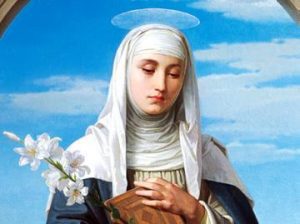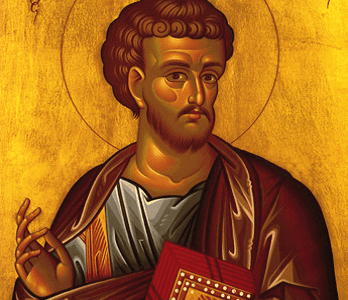
Saint Catherine of Siena, Doctor of the Church
Saint Catherine of Siena, Doctor of the Church Saint Catherine of Siena, whose feast day is April 29, was the first layperson, and alongside Saint Teresa of Avila, one of the first two women named a Doctor of the Church. She was born Caterina di Giacomo di Benincasa in Siena in 1347, the twenty-fourth of 25 children. She decided early on not to be married, and after several years of prayer and fasting, began an active life of service. She started by nursing the sick at a local hospital. Notable during that time was her aid to victims of the 1374 pandemic. As a young woman, Catherine believed she had a call to preach the Gospel. She organized a group of people to accompany her on mission trips where she urged her audiences to seek a deeper conversion to Christ in their lives through prayer and repentance. She became so extraordinarily successful that she had to recruit priests to serve as confessors to these large gatherings.
A devoted advocate of the Church, Catherine publicly promoted the offices of papacy, bishop and the clergy as Christ’s ambassadors, but she was also a sever critic of the abuses she saw among many members of the clergy and church hierarchy. She believed they should embrace poverty and assume a more humble spirit instead of “living in worldly luxury and ambitiousness and pretentious vanity.” “In fact,” she maintained, “many laypersons put them to shame by their good and holy lives.”
Catherine, though, knew that there could be no lasting reform of the Church without strong papal leadership. In 1376 she met with Pope Gregory XI in Avignon, France, where the papacy had been banished since 1309, and urged him to return to Rome. In one letter, she insisted that he must be “courageous” and not a “coward.” Catherine’s letter strengthened the pope’s resolve and he returned to Rome in 1377.
After Gregory’s death the following year and the election of Pope Urban VI, the Great Schism ensued. For the next 39 years, there would be at least two and sometimes three claimants to the papacy. Catherine sent frequent letters to Urban in the hope of moderating his severity towards his opponents. She also wrote to various other church authorities, encouraging them to recognize Urban as the legitimate successor to the Chair of Saint Peter.
Although a prodigious producer of letters, Catherine dictated her thoughts to others because she did not learn to write until near the end of her life. During the years 1377 to 1378, Catherine dictated The Dialogue, her reflections on the spiritual life. Many spiritual writers insist that this major work of mystical theology stands beside other great spiritual classics such as those of two other Doctors of the Church, Teresa of Avila and John of the Cross.
Pope Urban invited Catherine to Rome in 1380 to help lend support to his papacy, but on the way she suffered a stroke. She died on April 29, 1380. She was 33 years old.


